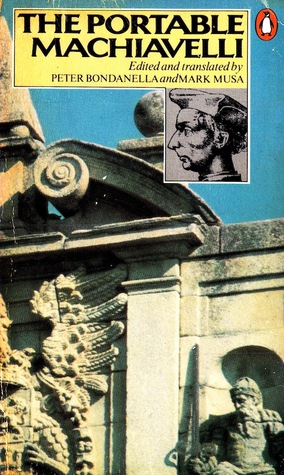Newly released
This book is new and will be uploaded as soon as it becomes available to us and if we secure the necessary publishing rights.

The Portable Machiavelli Book PDF
(0)
Author:
Niccolò MachiavelliNumber Of Reads:
75
Language:
English
Category:
Social sciencesSection:
Pages:
0
Quality:
good
Views:
1023
Quate
Review
Save
Share
Book Description
Edited and translated by Peter Bondanella and Mark Musa, "The Portable Machiavelli" not only gives the casual reader a chance to read different personal and professional works of Machiavelli, but also strives to do away with many of the myths that have plagued the man's posthumous fame. For example, the famous "the ends justifies the means" quote is actually a gross exaggeration of what Machiavelli originally wrote, which was "in the actions of all men...when there is no impartial arbiter, one must consider the final result." The biggest counterargument Bondanella and Musa can supply is the simple fact that they include a less famous piece Machiavelli did called "The Discourses." This piece is often not mentioned or even casually footnoted because it presents the true Machiavelli - a man who was supportive of a Republic government run by the citizens. Any one who believes Machiavelli is a supporter of despots will be surprised to read him speaking in support for fair and public trials and a balance of power between rulers and their people.
"When Niccolodi Bernardo Machiavelli entered the world on May 3, 1469, his prospects were modest at best. The Machiavelli were an established middle-class family from the Oltrarno district of Florence, and its members had held an impressive number of offices in the city's govern- ment, including twelve terms as gonfaloniere, or stand-
ard-bearer, and fifty-four terms as prior. NiccolO's father, Bernardo, however, was not one of the more prosperous members of the clan, and Machiavelli could never hope to riyal the wealth or influence of the greater patrician fami- lies of Florence, such as the Ridolfi, the Rucellai, the Strozzi, or the Guicciardini. But if Bernardo's means were
insufficient to guarantee his son instant access to eco- nomic and political power, his great interest in books, particularly the Latin classics, was perhaps a more valu- able legacy. We know that he possessed a copy of Flavio Biondo's Decades. that he borrowed a copy of Justin's history, and that he obtained a prized copy of Livy's his- tory of republican Rome in return for laboriously compil- ing for the printer an index of Livy's place-names."
Niccolò Machiavelli
Niccolò di Bernardo dei Machiavelli (Italian 3 May 1469 – 21 June 1527), occasionally rendered in English as Nicholas Machiavel,was an Italian diplomat, author, philosopher and historian who lived during the Renaissance. He is best known for his political treatise The Prince (Il Principe), written in about 1513 but not published until 1532.He has often been called the father of modern political philosophy and political science.For many years he served as a senior official in the Florentine Republic with responsibilities in diplomatic and military affairs. He wrote comedies, carnival songs, and poetry. His personal correspondence is also important to historians and scholars of Italian correspondence.He worked as secretary to the Second Chancery of the Republic of Florence from 1498 to 1512, when the Medici were out of power.Machiavelli's name came to evoke unscrupulous acts of the sort he advised most famously in his work, The Prince.He claimed that his experience and reading of history showed him that politics have always been played with deception, treachery, and crime.He also notably said that a ruler who is establishing a kingdom or a republic, and is criticized for his deeds, including violence, should be excused when the intention and the result is beneficial to him.Machiavelli's Prince has been surrounded by controversy since its release. Some considered it to be a straightforward description of the evil means used by bad rulers; many read in it evil recommendations to tyrants to help them maintain their power.Even into recent times, some scholars, such as Leo Strauss, have restated the traditional opinion that Machiavelli was a "teacher of evil".The term Machiavellian often connotes political deceit, deviousness, and realpolitik. Even though Machiavelli has become most famous for his work on principalities, scholars also give attention to the exhortations in his other works of political philosophy. While much less well known than The Prince, the Discourses on Livy (composed c. 1517) has been said to have paved the way of modern republicanism.It has also significantly influenced authors who have attempted to revive classical republicanism,including Hannah Arendt
Book Currently Unavailable
This book is currently unavailable for publication. We obtained it under a Creative Commons license, but the author or publisher has not granted permission to publish it.
Rate Now
5 Stars
4 Stars
3 Stars
2 Stars
1 Stars
The Portable Machiavelli Quotes
Top Rated
Latest
Quate
Be the first to leave a quote and earn 10 points
instead of 3
Comments
Be the first to leave a comment and earn 5 points
instead of 3